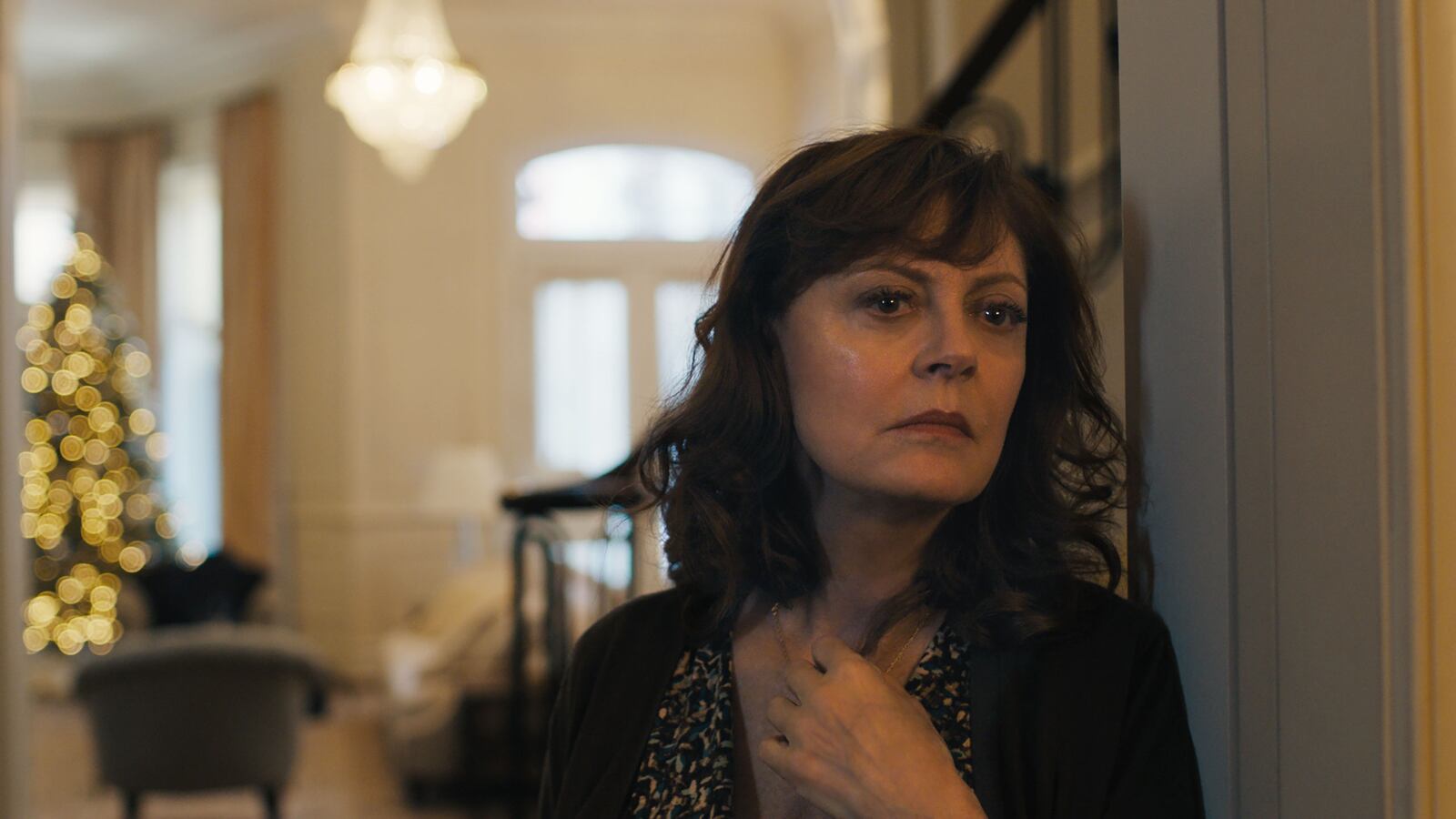In August of 2014, James Foley, an American journalist working in Syria, was beheaded by members of the Islamic State. His brutal death, after months of confinement by ISIL forces, was broadcast on the internet as a so-called “warning” to the United States and President Obama.
The plight of journalists like Foley who’ve been kidnapped, held for ransom, and often beheaded by religious extremists is a harrowing reminder of the dangers journalists face while reporting on the ground in hostile environments; it also serves as the inspiration for the film Viper Club, directed by Maryam Keshavarz and starring Susan Sarandon.
Viper Club, which has a wide release this Friday, follows the plight of a working mother, Helen (Sarandon), to free her journalist son from the extremists (ostensibly ISIL) who have taken him hostage while he’s on assignment in a foreign country. Helen attempts to navigate the tedious intricacies of federal bureaucracy in Washington, D.C., and grapples with the potential effects of paying the ransom her son’s captors demand (under U.S. law, it’s illegal to pay ransom to a terrorist group). Finally, a clandestine group of journalists and advocates reach out to Helen, who galvanizes them to raise the ransom her son’s captors demand for his life.
It’s a typical Hollywood portrayal of an all-too real phenomenon. But Viper Club is apparently just a thinly-veiled, Hollywood retelling of James Foley’s story—something his mother, Diane Foley, isn’t too happy about.
Diane Foley voiced her dissatisfaction with the film last month, as an article in The Hollywood Reporter reveals. Like Sarandon’s character Helen in the film, Diane Foley is a nurse, and like Helen, Foley also grappled with government agencies and orders to stay mum on the topic of her son’s disappearance. The character of Helen’s son could, of course, be inspired by any number of Western journalists slain by religious extremists, but Helen’s tireless fight to free her son, regardless of the cost, bears an eerie similarity to Diane Foley’s own tenacity—and she claims that filmmakers ripped off her entire life story without asking for her permission or participation.
“Nobody has ever reached out to me,” Foley told The Hollywood Reporter in September. “It’s very disappointing when people steal tragedies and try to make a profit out of them, very upsetting.” By accusing the filmmakers of exploiting her own personal tragedy for profit, Foley’s made it clear that her crusade for justice for slain journalists is far from over.
Keshavarz and the film’s producers have, for their part, denied that Foley’s story formed the sole basis for Viper Club. Keshavarz called Sarandon’s character “completely fictional,” but said she was influenced by a variety of stories about murdered foreign journalists, including Steven Sotloff and Daniel Pearl, while crafting the script. YouTube, who will stream the film exclusively after it’s out of theaters, echoed Keshavarz’s statement, telling THR, “We have the deepest sympathy for Diane Foley and everyone whose loved ones have ever been hurt or lost to an act of terrorism. The film, Viper Club, is a fictional account that was inspired by different stories and accounts and highlights the important and brave work that journalists undertake in perilous regions around the world.”
After pressing from Foley, YouTube eventually donated $40,000 to the James W. Foley Legacy Foundation, along with half of the company’s share of Viper Club’s theatrical proceeds, according to THR. Foley had said to the same outlet at the start of the controversy, “I would like Google, YouTube, the director, to make a generous donation to the training and the safety of freelance journalists, to the Foley Foundation that’s been named in Jim’s memory...If they’re going to use our story, without asking permission of anyone, the least they can do is make amends that way.” YouTube also revealed earlier this week that they had adjusted the film prior to its release to “to better reflect the everyday realities for conflict journalists, their families and the incredible risks they undertake to tell important stories from some of the most dangerous places in the world.”
Foley, who worked closely with the film’s producers to make adjustments, said in a statement to THR that ultimately, “I just feel much better about the film,” adding that she’s “very grateful that [the producers] were willing to listen...They were very cooperative, which was very helpful— healing, if you will.” It appears all’s well that ends well.
Or is it? There’s something a bit icky about a big studio production ripping off the tragic life story of a mother who lost a son—without giving her a word of advance warning. While real-life stories are no stranger to the Hollywood treatment, for a film with such sensitive, relevant source material, the fact that neither the director nor the producers thought to reach out to Foley—whose life and son’s death seem to form the entirety of the film’s plot, regardless of exec’s claims—is crass. At a time where even domestic journalists are facing violence and threats, a story like Foley’s could really resonate, if handled correctly.
And while Foley claims that it was a chance encounter with Susan Sarandon at the airport (after Viper Club’s screening at the Toronto Film Festival) that helped convince studio execs and Google/YouTube to rethink their approach, the latter’s involvement is a bit odd, given that Sarandon has recently under fire for her decontextualized comments about Donald Trump and the free press, and her questionable views on the 2016 election. For instance, Sarandon said while at the Toronto Film Festival that Donald Trump has “unintentionally energized” American politics—while making the point that there are more women and people of color running for office than before. She’s previously implied that Hillary Clinton was a worse choice than Trump for president.
Sarandon also discussed the “eroding truth” by the press in an interview with Yahoo! Entertainment at TIFF. While discussing a character in her new film The Death and Life of John F. Donovan who falls victim to tabloid scrutiny, Sarandon said, “Any kind of relationship gets scrutinized. It’s pretty hard to find a way to be private but also there’s an erosion of truth.” She continued, “People can print anything, Presidents can say anything, and it doesn’t matter if its opinion as opposed to the truth—it’s just presented as fact.”
“[There are] so many magazines with really specific in-depth stories that are completely based on creative writing so I think we’re living in a time that has become really difficult,” Sarandon said in the same interview. “You can accuse someone of something, or report something, and it is very hard to take it back.”







